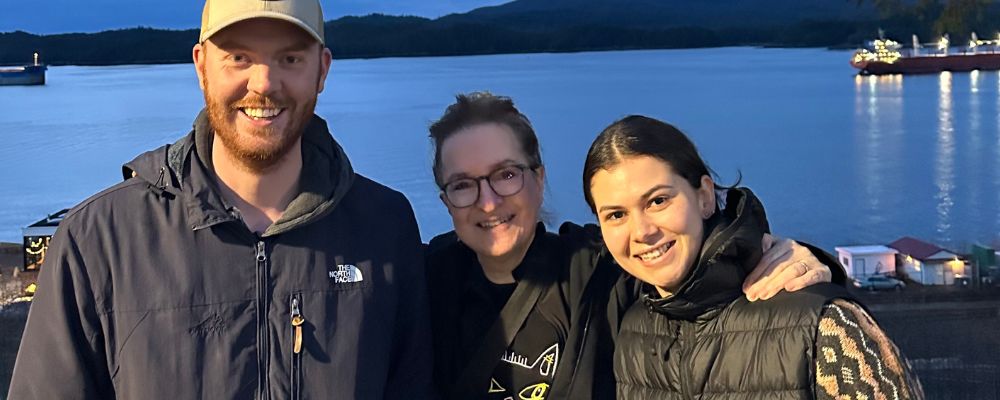
From left to right: Jacob Knight, Nancy Griffith-Zahner and Soli Ruiz-White
Jacob Knight (BEd ’25) and Soli Ruiz-White (BEd ’25) were no strangers to small communities.
Knight, who grew up in Rossland, BC, and Ruiz-White, from the Shuswap region, both arrived in Prince Rupert excited to explore life and teaching in a more remote setting. Both Knight and Ruiz-White brought with them a love for science and a willingness to dive into something new.
Helping guide their journey was Nancy Griffith-Zahner, a retired educator and field advisor for the Okanagan School of Education. After more than two decades of teaching French in Prince Rupert, Griffith-Zahner now mentors the next generation of teachers, supporting them in learning not just how to teach, but how to teach with care, connection, and cultural respect.
“I started teaching as my third career, and those experiences have helped me connect with students in a different way,” Griffith-Zahner says. “As a field advisor now, I try to support student teachers not just in learning to teach—but in learning to teach with care, with connection, and with respect for the communities they’re entering. It wasn’t just about teaching—it was about learning how to teach in a good way, on this land.”
The Reality of Teaching in a Tight-Knit Community
One of the most immediate differences the interns noticed was the warm welcome they received in the Prince Rupert schools, and community.
“You walk into a place and the first week people are saying, ‘You must be the new teachers at the school.’ It didn’t take five minutes for people to know who we were,” Knight says. “The school community here is incredibly welcoming. There’s a real desire for teachers to stay, which makes it feel much more supportive than in larger cities. The staff are always sharing resources and ideas.”
Ruiz-White echoed that sentiment, reflecting on her mentorship during the placement.
“Nancy was absolutely amazing, and a great adviser, who did so much for us—not just in terms of the program but also as a mentor. She was always there for us and constantly providing resources.”
Living in a small community also means encountering students everywhere: at the grocery store, gym sporting events, and on hiking trails.
“You can’t go to the grocery store without seeing a few of them,” he says. “They try to bug you when you’re doing something, but it’s all in good fun.”
Ruiz-White found these encounters enriching.
“I actually really did like bumping into my students outside of class because I liked to know what they were doing,” she says. “It just made everything feel more personal.”
Griffith-Zahner believes this interconnectedness is one of the city’s greatest strengths.
“Inside the classroom, you’re the teacher. Outside the classroom, you’re seen more like an aunt or a grandmother,” she says. “There’s so much overlap between school and community. It’s not just about teaching, it’s about being part of people’s lives.”
Where the School is the Heart of the Community
Ruiz-White quickly discovered that schools in Prince Rupert were more than places of learning—they were true community hubs.
“Everyone came out to support student plays, sports, and fundraisers,” she says. “It feels like everyone is rooting for the kids.”
But it’s not just the people that make teaching in Prince Rupert special—it’s also the place itself. As Griffith-Zahner emphasizes, Prince Rupert is firmly situated on Ts’msyen land, and Indigenous culture is highly visible and valued.
“This is 100% a city on Ts’msyen land,” she explains. “Indigenous perspectives and ways of knowing are part of everyday learning.”
Ruiz-White recalls being particularly moved by her school’s Remembrance Day ceremony.
“It wasn’t like anything I’d seen before,” she says. “Students sang traditional songs and wore regalia. It was emotional and powerful—and it showed how deeply pride and culture are woven into the school community.”
Looking Ahead
After completing his internship, Knight decided to stay in Prince Rupert, taking on a contract as a high school biology teacher.
“There was a job waiting for me, and I wasn’t ready to leave,” he says. “I like the idea of trying out different places in BC eventually, but for now, I’m happy here.”
Ruiz-White, meanwhile, has returned to the interior and is teaching at her former high school—a full-circle moment.
“Coming back to teach in the classrooms where I once sat has been surreal,” Ruiz-White says. “My time in Prince Rupert gave me the confidence and adaptability to step into this role.”
Teaching in a remote community like Prince Rupert offers a truly unique teaching environment. While limited staffing, fewer classroom supports, and geographic distance can pose challenges, they also create opportunities for meaningful growth. These conditions encourage new teachers to become more flexible, inventive, and deeply connected to their students and colleagues.
“You learn to differentiate your instruction, manage your time well, and be there for every student,” Ruiz-White says. “Even when resources are stretched, the community fills the gaps in ways that feel deeply human.”
Looking back on their northern adventure, both interns have advice for others considering rural placements.
“Get involved in the community right away,” Knight says. “If you don’t, it can feel isolating. But if you do, you’ll find your place. There’s always something happening and the people here will welcome you in.”
“Just go,” Ruiz-White says. “It’s only a few months of your life, and it might just change everything. You’ll learn so much—not just about teaching, but about yourself.”